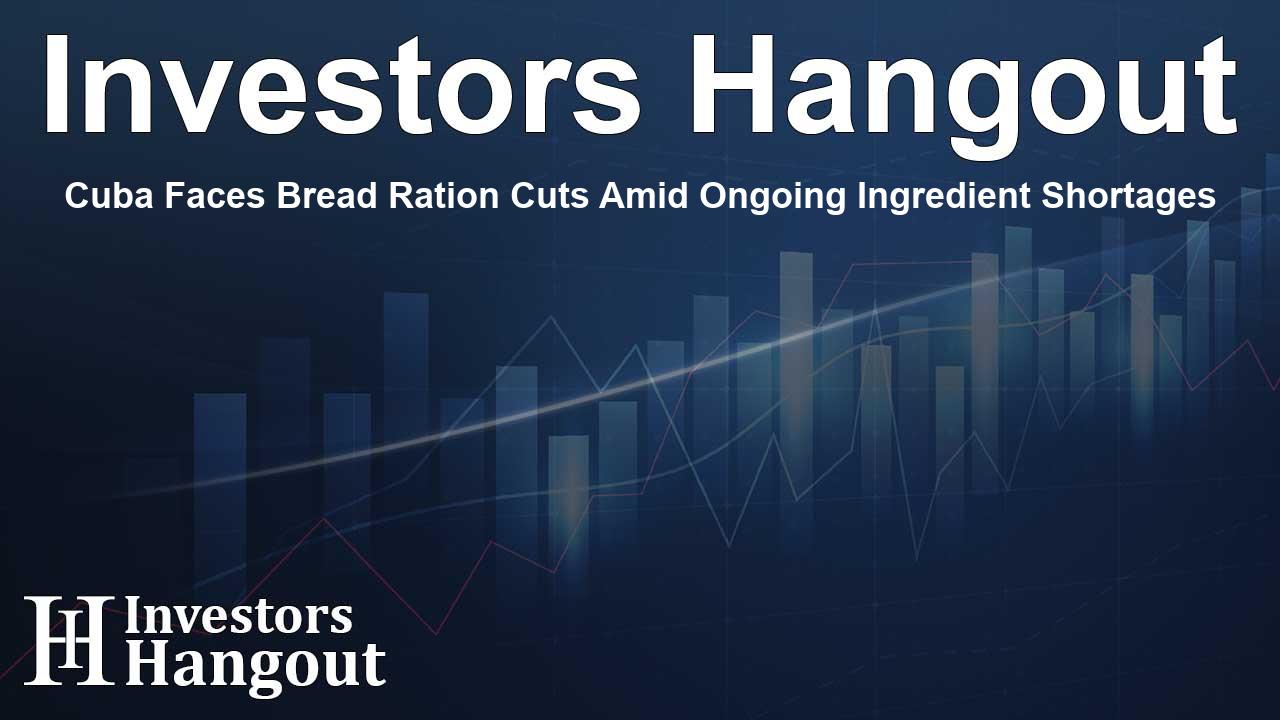Cuba Faces Bread Ration Cuts Amid Ongoing Ingredient Shortages

Cuba Faces Bread Ration Cuts Amid Ongoing Ingredient Shortages
In a recent decision that reflects the growing economic pressures on the island nation, Cuba's government has reduced the daily bread ration by a quarter. The weight of subsidized bread is now down from 80 grams to 60 grams, a drastic measure in the face of dwindling supplies. This change has drawn the ire of citizens who have come to rely on this basic staple amid widespread shortages.
Impact on Daily Lives of Cubans
For most residents, food prices have become a significant burden. With an average monthly income of only around 4,648 pesos, equivalent to approximately $15, many in Cuba find themselves struggling to afford basic necessities. The reduction in bread allocation to about the size of a small cookie or bar of soap only worsens the plight of families.
Dolores Fernandez, a resident of Havana, expressed her discontent as she stood outside a bakery. Her sentiments echo the frustration many feel: "We have to accept it, what else can we do?" The reality is stark; for many, the options available for purchasing bread are limited, with private market prices out of reach.
Government’s Blame Game: Wheat Shortage and Trade Embargo
The government has attributed this ongoing crisis to a shortage of wheat flour essential for producing bread. This scarcity is blamed on the stringent U.S. trade embargo, which complicates Cuba's international trade efforts and financial transactions. The tumultuous situation has been exacerbated by ongoing shortages of food, fuel, and medicine, prompting countless citizens to seek better opportunities abroad.
Historical Context of Food Rationing in Cuba
Food rationing in Cuba, which began as a vital support system following the 1959 revolution, has drastically changed over the years. The "libreta," or ration book, used to provide a host of essential items at heavily discounted rates, including not just bread, but also meat, milk, and household necessities.
Unfortunately, today’s reality paints a much bleaker picture. Many of the products citizens relied on have fallen by the wayside, and when they do become available, they often arrive late and in poor condition. This decline in quality is felt across various sectors, including staples like bread. Bernardo Matos, another Havana resident, commented on the disappointing quality, saying, "The flour tastes like acid," reflecting the frustration felt by many regarding the decline in food standards.
Future Measures and International Support
In a bid to mitigate these challenges, Cuba earlier this year turned to the World Food Programme for assistance in securing essential supplies, particularly powdered milk for children. This highlights the urgent need for reliable sources of staple goods in a country where households are facing increasing food insecurity.
Examining the Broader Context of Rationing
The practice of rationing is increasingly rare in today’s world, typically reserved for wartime or during natural disasters. However, in Cuba's unique economic climate characterized by ongoing systemic challenges, rationing continues to play a role in citizens' daily lives. For many on the island, the cuts to the bread ration may just be the latest in a string of difficulties that threaten their well-being.
The future remains uncertain for Cuba as residents brace for what these changes mean for their already strained daily lives. As the government seeks to address sustainability and quality control in food production, the hopes of many Cubans hang in the balance, with continued shortages posing serious questions about food security on the island.
Frequently Asked Questions
What led to the bread ration reduction in Cuba?
The reduction is primarily due to a shortage of wheat flour, which the Cuban government attributes to the U.S. trade embargo and ongoing economic challenges.
How much is the new daily bread ration in Cuba?
The weight of the daily bread ration has been reduced from 80 grams to 60 grams, which is about the size of a small cookie.
Why are food shortages prevalent in Cuba?
Cuba is experiencing severe shortages of food, fuel, and medicine due to a combination of economic mismanagement, the trade embargo, and the impacts of the pandemic.
How does the rationing system work in Cuba?
The rationing system, known as the "libreta," provides subsidized food and goods to citizens, but has seen significant reductions in available products over the years.
What has the Cuban government said about food quality?
The government has indicated plans to enhance inspections at state bakeries to ensure the quality of bread and other products does not worsen amid the ongoing shortages.
About The Author
Contact Henry Turner privately here. Or send an email with ATTN: Henry Turner as the subject to contact@investorshangout.com.
About Investors Hangout
Investors Hangout is a leading online stock forum for financial discussion and learning, offering a wide range of free tools and resources. It draws in traders of all levels, who exchange market knowledge, investigate trading tactics, and keep an eye on industry developments in real time. Featuring financial articles, stock message boards, quotes, charts, company profiles, and live news updates. Through cooperative learning and a wealth of informational resources, it helps users from novices creating their first portfolios to experts honing their techniques. Join Investors Hangout today: https://investorshangout.com/
The content of this article is based on factual, publicly available information and does not represent legal, financial, or investment advice. Investors Hangout does not offer financial advice, and the author is not a licensed financial advisor. Consult a qualified advisor before making any financial or investment decisions based on this article. This article should not be considered advice to purchase, sell, or hold any securities or other investments. If any of the material provided here is inaccurate, please contact us for corrections.
